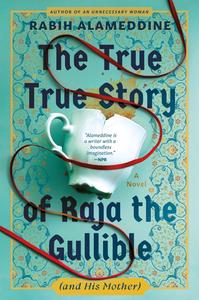
|
|
| Rabih Alameddine (image: Oliver Wasow) |
|
Rabih Alameddine is the author of Comforting Myths: Concerning the Political in Art; novels including The Angel of History, The Wrong End of the Telescope, and An Unnecessary Woman; and the story collection The Perv. He divides his time between his bedroom and his living room. His latest novel, The True True Story of Raja the Gullible (and His Mother) (Grove Press; reviewed in this issue), considers the life of a high school philosophy teacher in Beirut and his fractious relationship with his overbearing mother.
You are a painter as well as a writer--what is the relationship between the two?
I'm not very good at painting, which is fine, because part of the reason I enjoy it is I don't ask of myself a lot. It's as if I no longer enjoy writing; I put so much pressure on myself.
I started taking piano lessons at around 58, and I can't say I am the worst piano player ever, but it's close. I love that there's no requirement. Removing the pressure, painting allows me to play.
It takes two to three years for something to grab a hold of me for a writing project. It might be interesting for a month or for an hour, but to sustain interest for the three to four years that it takes to write, is a big thing. Whereas with painting--ooh! That's a lovely tree! It's expressing a feeling at that time. It's not necessarily instantaneous, but it's not a long-term obsession. Writing is all about obsession, what will not leave my head.
It's the pressure of making something good that troubles me. I watched a documentary on Meredith Monk the other day, and I was fascinated. She does a lot that is just experimental. It might work, it might not, people might see it, they might not. And I started thinking, when was the last time I did something like that? I don't know.
Painting and bad piano playing allow me to relax. To allow play back into my work. I make it sound like my work is serious, which it isn't, but my intention is serious. And I think that's the problem. One of the worst things an artist can do is take themselves seriously. You have to take it a little seriously, but there has to be some part of me that always goes, ha ha! You think that's good! Otherwise it becomes too earnest. There has to be a part of me that wants to change the world and a part of me that says, fuck it.
 Does your wonderful humor come naturally?
Does your wonderful humor come naturally?
Humor is my defense mechanism. How can one live in this world and be conscious of all the traumas that we cause and still be sane if one didn't have a sense of humor? How do we deal with the Trump years? One of my ideas was to write this book where this woman gets distracted by two men, one who's all sex and the other who's all patriotism. I'm trying to see, would that work as distraction? Would having a lot of sex counter the guilt of being part of a genocide? Or cutting Medicaid on millions of people? How do we deal with these things? What is the distraction? For me, it's humor. In an insane world, being insane is quite normal.
Raja the Gullible starts and ends in 2023 but jumps timelines in the middle.
I did not want to deal with Gaza, so it had to stop in 2023. There's no way anybody living in Lebanon or, for me, in the United States, could not deal with it if it goes past 2023. Hakawati ended in 2003, right before the Iraq invasion. You can't not deal with it, and dealing with it would take over the book.
I wanted this parabolic look at life, and the center of it is the kidnapping, if you want to call it that. I was interested in how we looked at trauma, and how trauma has become identity. We have prescribed ways of dealing with trauma; I sometimes think that it might be better if we go back to not dealing with trauma. We forget that two people might have the same experience and have completely different outlooks. We tend to think this person is this way because such and such happened to them. This is not just wrong, it's insane! Not even Freud ever suggested that this would explain everything. It has become a cliché: my father did not pay any attention to me and that's why I fall for men who are such and such. That's bullshit! I went to see this movie, one of the Marvel superhero movies, and it had a talking racoon. And the movie actually went back to how the raccoon was tortured as a baby raccoon, and I thought, wait, am I supposed to become attached to a raccoon?! This book is sort of the anti-raccoon. Yes, yes, Raja could go back and deal with [his trauma], but dealing with this is not his primary concern. He's functioning. That's what I was going for... and then I started writing, and the mother took over.
I did want to write about love. Whether you want to call what was between the two boys Stockholm syndrome--I hate these terms, because it assumes the syndrome is the same for everybody. It isn't. I wanted to show different kinds of love. It turns out that the weirdest was Raja and his mother. They're completely devoted to each other, and they want to kill each other. There's one line: Raja says, "I want to kill my mother. I don't want to hurt her!" If you live through a civil war and you're kidnapped, how much would you want the world to be orderly and controlled? He's a control queen. His mother is, what is the opposite of a control queen? A chaos queen. That was the primary tension.
What do you hope your writing offers to the world?
I am both still shocked that anybody reads me--What?! You don't have anything better to do with your time?--and shocked that I am not read by absolutely every single person on earth. It is in this tension between 'you must listen to me' and 'why would you listen to me' that I think art resides. This tension of narcissist megalomania and, I don't want to call it self-loathing, but feelings of utter incompetence. I hope that tension makes something good.
A book doesn't exist without a reader, but we're all different. If you write in every detail, down to the knot in your shoelaces, that leaves little to the reader's imagination. I tend to write just enough description to be believable, but readers fill in the rest. Because we're all so different, each reader brings something different. I used to think if we could just empathize--but a book can never do that, in my mind. If this romantic notion were true, that a book can change a life... there are so many amazing books, and we still commit genocide. It is my perspective that what you get out of it is yours--it's not from the book. Maybe what books do is light a fire under you. What you already had. --Julia Kastner, blogger at pagesofjulia

